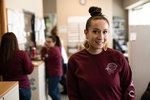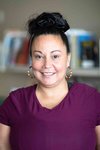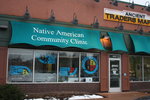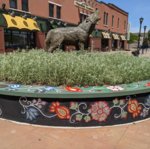



A patient who had an appointment for a COVID-19 vaccine was having second thoughts. They were anxious to receive the vaccine and did not know if they wanted to continue on the day that they were scheduled for. Anita Tapio, the traditional healing coordinator at the Native American Community Clinic, set up smudging with the patient. Smudging is a ceremony involving sacred herbs or resins that purifies or cleanses the soul of negative thoughts of a person or place. After smudging and having a conversation with Tapio about getting her own booster, the patient felt less anxious about the vaccine and was ready to receive it.
“I think combining healthcare and culture is vitally important because without having culture, there will always be that piece missing,” Tapio said.
The Native American Community Clinic (NACC), located at 1213 East Franklin Avenue in Minneapolis, opened its doors in 2003 to address the health disparities within the urban Native American community of the Twin Cities. Their mission is to promote the health and wellness of mind, body, and spirit of Native American families, and offer a full range of healthcare services that include medical, behavioral health, dental, and substance abuse programs. As a community clinic, NACC will see patients regardless of ability to pay.
NACC combines their healthcare services with traditional medicine and culture. The clinic aims to honor health and tradition by providing spiritual care and access to traditional healing. To promote these ideals, the traditional healing committee planted sage in the garden outside the clinic. Sage is used for smudging within the clinic, and is given to community members. The clinic has also planted tobacco, sweetgrass, cedar and other traditional medicines around the clinic to provide teachings and to be used by community members.
“The relief that some of our patients feel when we’re able to provide sage or smudge, I don’t even know how to describe it, but it’s such a cool feeling to know that we’re able to help people in this way,” NACC Operations Manager Ashlee Jallen said.
NACC also provides classes for the community members that they serve. One of these classes is making jingle dresses where participants will be given the necessary materials and taught how to create them before pow wow season. Classes like these help people to come back to their culture and find acceptance and support. Tapio mentioned that many participants will come back and are excited to make jingle dresses for their granddaughters and friends.
“Knowing that there’s something bigger than you and having spirituality is vitally important,” Tapio said. “Just as important as the medical piece.”
The clinic also has a holistic approach to healthcare. They aim to address the root causes of health disparities like access to food, housing and health insurance. According to the Minnesota Department of Health, entire tribal communities, like the Red Lake Reservation, lack access to fresh and healthy food. And, according to the Minnesota Homeless Study, 48% of Native Americans were homeless in 2018. The clinic addresses these disparities through resource navigation, care coordination, outreach and community-based activities through the use of peer recovery coaches and community health workers. NACC also partners with outside businesses and nonprofits in order to connect any individuals with the care that they need.
“Our patients tend to come here more than once, and we get to build that relationship with them and we really make sure that we get them the services that they need. If we can’t provide it, we find outside resources that can,” Jallen said.
In addition, NAAC offers several unique substance abuse treatment programs in partnership with the Red Lake Nation. They provide a heroin and opioid addiction program that includes daily dosing, harm reduction services, spiritual care, mental health care, nurse care coordination, and drug and alcohol counseling. A culturally-centered approach outpatient program is also offered, which is rooted in Indigenous spiritual practices to treat substance use disorders. This program includes individualized programming with a gradual step-down, daily prayer and cultural teachings by NACC’s Elder in Residence, medication assisted treatment, health education, relapse prevention, individual, family and group therapy, and peer recovery support.
“I’ve seen women who were recovering from addiction. They came in and made Ribbon Skirts or learned dances that they’ve wanted to but never could,” Tapio said. “Seeing them complete that and get excited about their culture brought tears to my eyes. It sparks something in them.”
Comments
No comments on this item Please log in to comment by clicking here